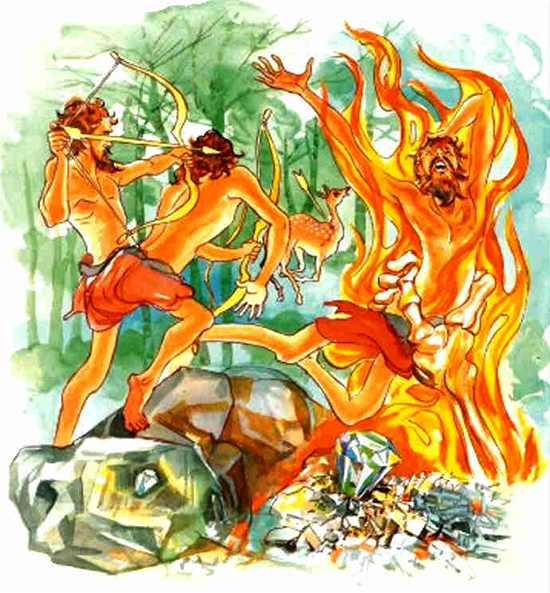Verse 161: The evil done by oneself, arising in oneself, and caused by oneself, destroys the foolish one, just as a diamond grinds the rock from which it is formed.
The Story of Mahakala Upasaka
While residing at the Jetavana monastery, the Buddha uttered Verse (161) of this book, with reference to Mahakala, a lay disciple.
On a certain sabbath day, Mahakala, a lay disciple, went to the Jetavana monastery. On that day, he kept the sabbath by observing the eight moral precepts (Uposatha sila) and listened to the discourses on the Dhamma throughout the night. It so happened that on that same night, some thieves broke into a house; and the owners on waking up went after the thieves. The thieves ran away in all directions. Some ran in the direction of the monastery. It was then nearing dawn, and Mahakala was washing his face at the pond close to the monastery. The thieves dropped their stolen property in front of Mahakala and ran on. When the owners arrived, they saw Mahakala with the stolen property. Taking him for one of the thieves they shouted at him, threatened him and beat him hard. Mahakala died on the spot. Early in the morning, when some young bhikkhus and samaneras from the monastery came to the pond to fetch water, they saw the dead body and recognize it.
On their return to the monastery, they reported what they had seen and said to the Buddha, “Venerable Sir! The lay disciple who was at this monastery listening to the religious discourses all through the night has met with a death which he does not deserve.” To them the Buddha replied, “Bhikkhus! If you judge from the good deeds he has done in this existence, he has indeed met with a death he does not deserve. But the fact is that he has only paid for the evil he had done in a past existence. In one of his previous existences, when he was a courtier in the palace of the king, he fell in love with another man’s wife and had beaten her husband to death. Thus, evil deeds surely get one into trouble; they even lead one to the four apayas.”
Then the Buddha spoke in verse as follows:
Verse 161: The evil done by oneself, arising in oneself, and caused by oneself, destroys the foolish one, just as a diamond grinds the rock from which it is formed.
Dhammapada Verse 161
Mahakala Upasaka Vatthu
Attana hi katam papam
attajam attasambhavam
abhimatthati dummedham
vajiramva’smamayam manim.
Source: Tipitaka








Add a comment